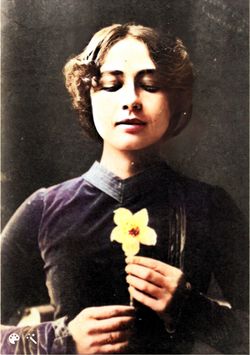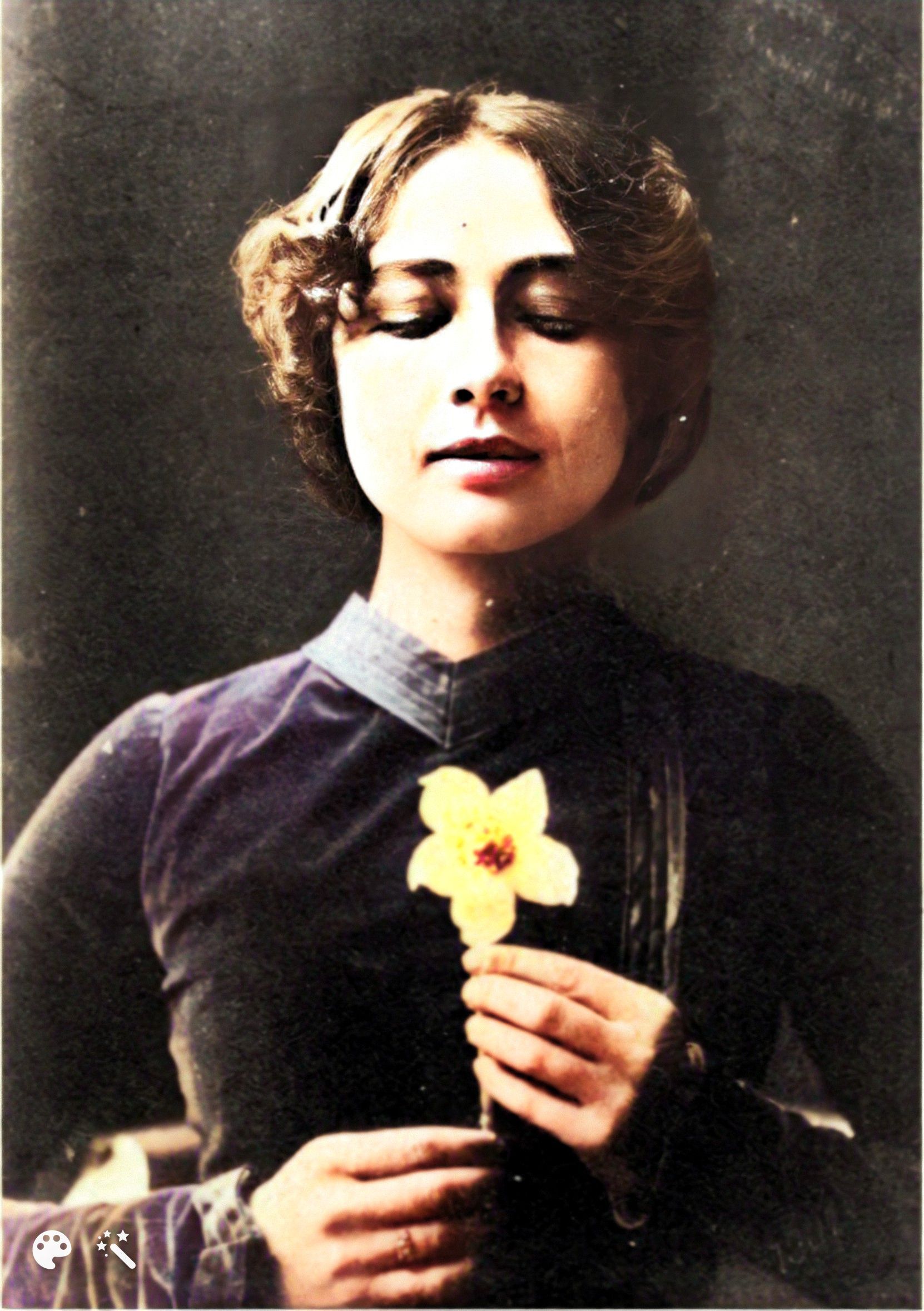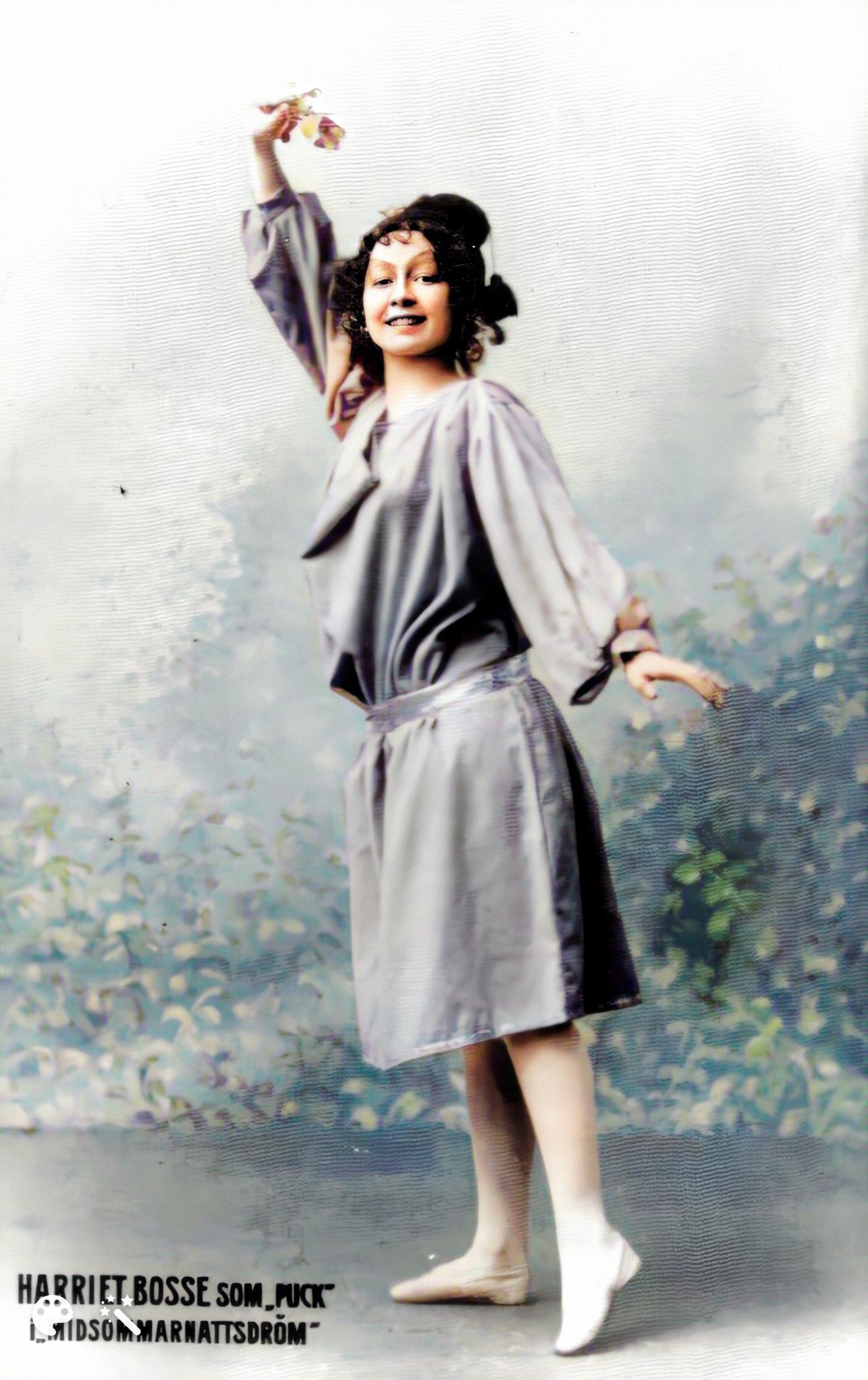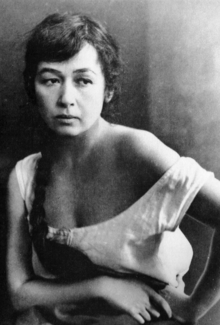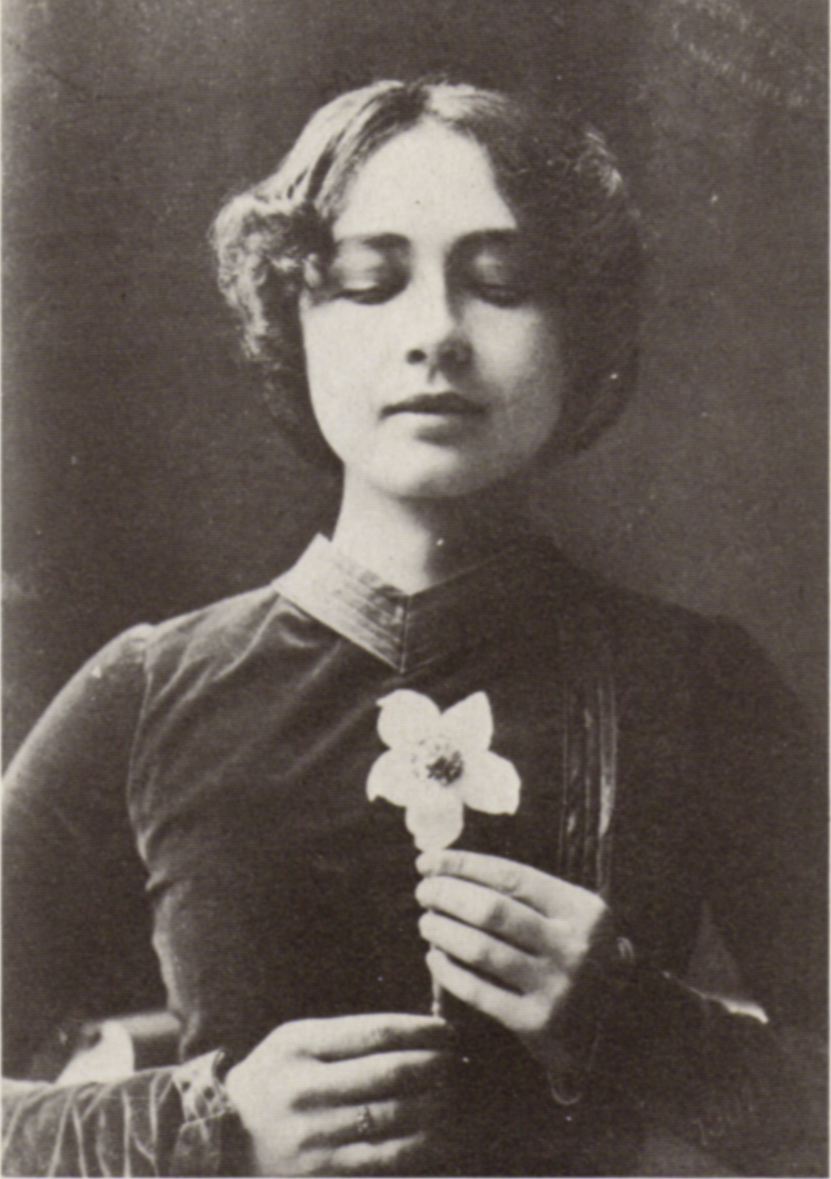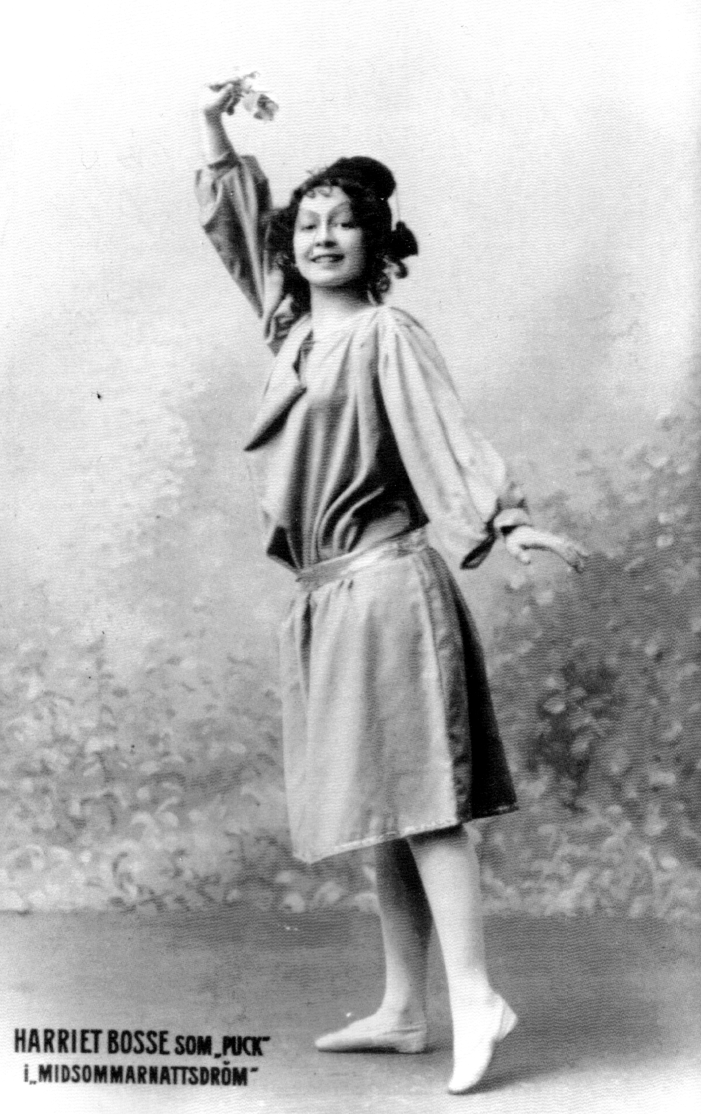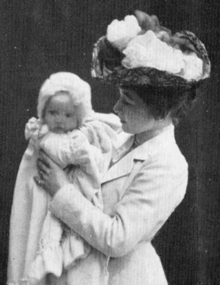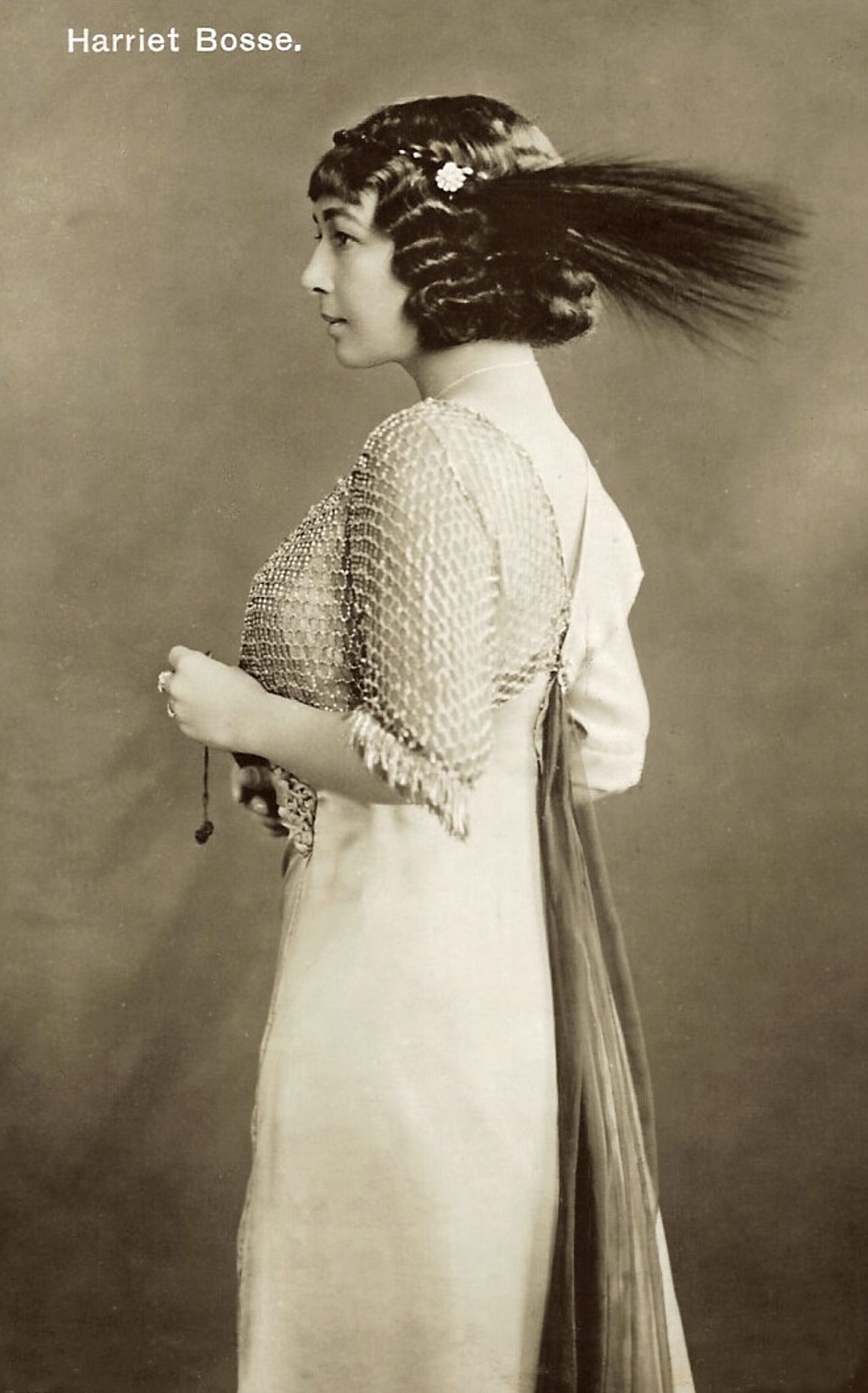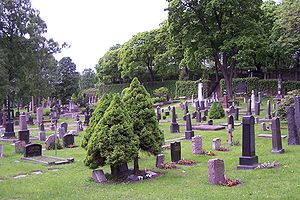After a whirlwind courtship, which unfolds in detail in Strindberg's letters and diary, Strindberg and Bosse were married in 1901, when he was 52 and she 23. Strindberg wrote a number of major roles for Bosse during their short and stormy relationship, especially in 1900–01, a period of great creativity and productivity for him. Like his previous two marriages, the relationship failed as a result of Strindberg's jealousy, which some biographers have characterized as paranoid. The spectrum of Strindberg's feelings about Bosse, ranging from worship to rage, is reflected in the roles he wrote for her to play, or as portraits of her. Despite her real-life role as muse to Strindberg, she remained an independent artist.
Bosse married Swedish actor Anders Gunnar Wingard in 1908, and Swedish screen actor, director, and matinee idol Edvin Adolphson in 1927. All three of her marriages ended in divorce after a few years, leaving her with a daughter by Strindberg and a son by Wingård. On retiring after a high-profile acting career based in Stockholm, she returned to her roots in Oslo.
After many years of ambitious and successful free-lance acting, Bosse found her options narrowing in the 1930s. The Great Depression brought her economic hardship, and, even though she looked younger than her age, most important women's roles were out of her age range. Her technique was still often praised, but also sometimes perceived as old-fashioned and mannered, in comparison with the more ensemble-oriented style of the times.[56] Finding herself unneeded by any Swedish repertory theatre, she only managed to return as a member of Dramaten by means of skillful persuasion and pointed reminders of her long history there. A humble employee at a humble salary, she played only fifteen roles, all minor, during her last ten years at Dramaten, 1933–43.
Both before and after the divorce from Strindberg, Bosse was a Stockholm celebrity in her own right. Her independence and self-supporting status gained her a reputation for being strong-willed and opinionated, insisting on, and receiving, high pay and significant roles. She left Dramaten with its conventional repertoire and began working at Albert Ranft's Swedish Theatre, where she and the skillful but more modest actor (Anders) Gunnar Wingård (1878–1912)formed a popular co-star team. She travelled frequently, particularly for guest performances in Helsinki, leaving little Anne-Marie with Strindberg, a competent and affectionate father. In 1907, Bosse made theatrical history as Indra's daughter in Strindberg's epoch-making Dream Play. She and Strindberg met weekly for dinner at his house, and remained lovers until she severed connections in preparation for her marriage with Gunnar Wingård in 1908.[51] In 1909 the Wingårds had a son, Bo. This marriage was also brief, ending in divorce in 1912. According to rumour, the cause of the divorce was Wingård's infidelity. However, Strindberg also heard gossip that Wingård's large debts threatened Bosse's finances.
In 1911, a divorced woman with two children to care for and support, Bosse returned to Dramaten. Strindberg was at that time fatally ill with cancer; he died on 14 May 1912. 1912 was altogether a year of death and disaster for the Bosse and Strindberg families: Alma Fahlstrøm's son Arne went down with the Titanic on 15 April; Strindberg's first wife Siri von Essen died later the same month; von Essen's and Strindberg's daughter Greta, a promising young actress, was killed in a train crash in June; and Bosse's divorced husband Gunnar Wingård shot himself on 7 October. Strindberg's funeral was a national event. Gunnar Wingård, a popular and charming actor, was also the subject of public grief. Throughout these shattering events, which left both her children fatherless, Bosse kept up her busy schedule, apart from a few days off, distraught and grief-stricken, after Wingård's suicide. For months after it, she received anonymous letters and threatening phone-calls, blaming her for Wingård's depression and death.
Retiring from the stage during World War II, Bosse considered moving back to Norway's capital Oslo, the home of her childhood and youth. Both her children had settled there. The move was delayed for ten years, during which she travelled whenever possible, and when it took place in 1955, she perceived it to be a mistake. Her brother Ewald's death in 1956 left her the only survivor of the fourteen children of Anne-Marie and Johann Heinrich Bosse. "How I long desperately for Stockholm", she wrote to a friend in 1958. "My whole life is there."[58] She became chronically melancholy, enduring failing health and bitter memories of the final phase of her career at Dramaten.
Bosse always guarded her privacy, so much so that the memoir she wrote of her life with Strindberg was deemed to be too uninterestingly discreet to be publishable.
She is buried in the family plot at Vår Frelsers kyrkogård, a cemetery in Oslo, Norway, located north of Hammersborg in Gamle Aker district. It was created in 1808 as a result of the great famine and cholera epidemic of the Napoleonic Wars. Its grounds were extended in 1911.
Harriet was mainy a stage actress, but her flms credits are:
1944 Appassionata
Mrs. Lenander
1943 The Sin of Anna Lans
Baroness Löwenfeldt
1936 Bombi Bitt och jag
Franskan
1920 Karin Ingmarsdotter
Brita
1919 Comrades
Bertha
1919 Ingmarssönerna
Brita
After a whirlwind courtship, which unfolds in detail in Strindberg's letters and diary, Strindberg and Bosse were married in 1901, when he was 52 and she 23. Strindberg wrote a number of major roles for Bosse during their short and stormy relationship, especially in 1900–01, a period of great creativity and productivity for him. Like his previous two marriages, the relationship failed as a result of Strindberg's jealousy, which some biographers have characterized as paranoid. The spectrum of Strindberg's feelings about Bosse, ranging from worship to rage, is reflected in the roles he wrote for her to play, or as portraits of her. Despite her real-life role as muse to Strindberg, she remained an independent artist.
Bosse married Swedish actor Anders Gunnar Wingard in 1908, and Swedish screen actor, director, and matinee idol Edvin Adolphson in 1927. All three of her marriages ended in divorce after a few years, leaving her with a daughter by Strindberg and a son by Wingård. On retiring after a high-profile acting career based in Stockholm, she returned to her roots in Oslo.
After many years of ambitious and successful free-lance acting, Bosse found her options narrowing in the 1930s. The Great Depression brought her economic hardship, and, even though she looked younger than her age, most important women's roles were out of her age range. Her technique was still often praised, but also sometimes perceived as old-fashioned and mannered, in comparison with the more ensemble-oriented style of the times.[56] Finding herself unneeded by any Swedish repertory theatre, she only managed to return as a member of Dramaten by means of skillful persuasion and pointed reminders of her long history there. A humble employee at a humble salary, she played only fifteen roles, all minor, during her last ten years at Dramaten, 1933–43.
Both before and after the divorce from Strindberg, Bosse was a Stockholm celebrity in her own right. Her independence and self-supporting status gained her a reputation for being strong-willed and opinionated, insisting on, and receiving, high pay and significant roles. She left Dramaten with its conventional repertoire and began working at Albert Ranft's Swedish Theatre, where she and the skillful but more modest actor (Anders) Gunnar Wingård (1878–1912)formed a popular co-star team. She travelled frequently, particularly for guest performances in Helsinki, leaving little Anne-Marie with Strindberg, a competent and affectionate father. In 1907, Bosse made theatrical history as Indra's daughter in Strindberg's epoch-making Dream Play. She and Strindberg met weekly for dinner at his house, and remained lovers until she severed connections in preparation for her marriage with Gunnar Wingård in 1908.[51] In 1909 the Wingårds had a son, Bo. This marriage was also brief, ending in divorce in 1912. According to rumour, the cause of the divorce was Wingård's infidelity. However, Strindberg also heard gossip that Wingård's large debts threatened Bosse's finances.
In 1911, a divorced woman with two children to care for and support, Bosse returned to Dramaten. Strindberg was at that time fatally ill with cancer; he died on 14 May 1912. 1912 was altogether a year of death and disaster for the Bosse and Strindberg families: Alma Fahlstrøm's son Arne went down with the Titanic on 15 April; Strindberg's first wife Siri von Essen died later the same month; von Essen's and Strindberg's daughter Greta, a promising young actress, was killed in a train crash in June; and Bosse's divorced husband Gunnar Wingård shot himself on 7 October. Strindberg's funeral was a national event. Gunnar Wingård, a popular and charming actor, was also the subject of public grief. Throughout these shattering events, which left both her children fatherless, Bosse kept up her busy schedule, apart from a few days off, distraught and grief-stricken, after Wingård's suicide. For months after it, she received anonymous letters and threatening phone-calls, blaming her for Wingård's depression and death.
Retiring from the stage during World War II, Bosse considered moving back to Norway's capital Oslo, the home of her childhood and youth. Both her children had settled there. The move was delayed for ten years, during which she travelled whenever possible, and when it took place in 1955, she perceived it to be a mistake. Her brother Ewald's death in 1956 left her the only survivor of the fourteen children of Anne-Marie and Johann Heinrich Bosse. "How I long desperately for Stockholm", she wrote to a friend in 1958. "My whole life is there."[58] She became chronically melancholy, enduring failing health and bitter memories of the final phase of her career at Dramaten.
Bosse always guarded her privacy, so much so that the memoir she wrote of her life with Strindberg was deemed to be too uninterestingly discreet to be publishable.
She is buried in the family plot at Vår Frelsers kyrkogård, a cemetery in Oslo, Norway, located north of Hammersborg in Gamle Aker district. It was created in 1808 as a result of the great famine and cholera epidemic of the Napoleonic Wars. Its grounds were extended in 1911.
Harriet was mainy a stage actress, but her flms credits are:
1944 Appassionata
Mrs. Lenander
1943 The Sin of Anna Lans
Baroness Löwenfeldt
1936 Bombi Bitt och jag
Franskan
1920 Karin Ingmarsdotter
Brita
1919 Comrades
Bertha
1919 Ingmarssönerna
Brita
Family Members
Sponsored by Ancestry
Advertisement
Records on Ancestry
Advertisement
